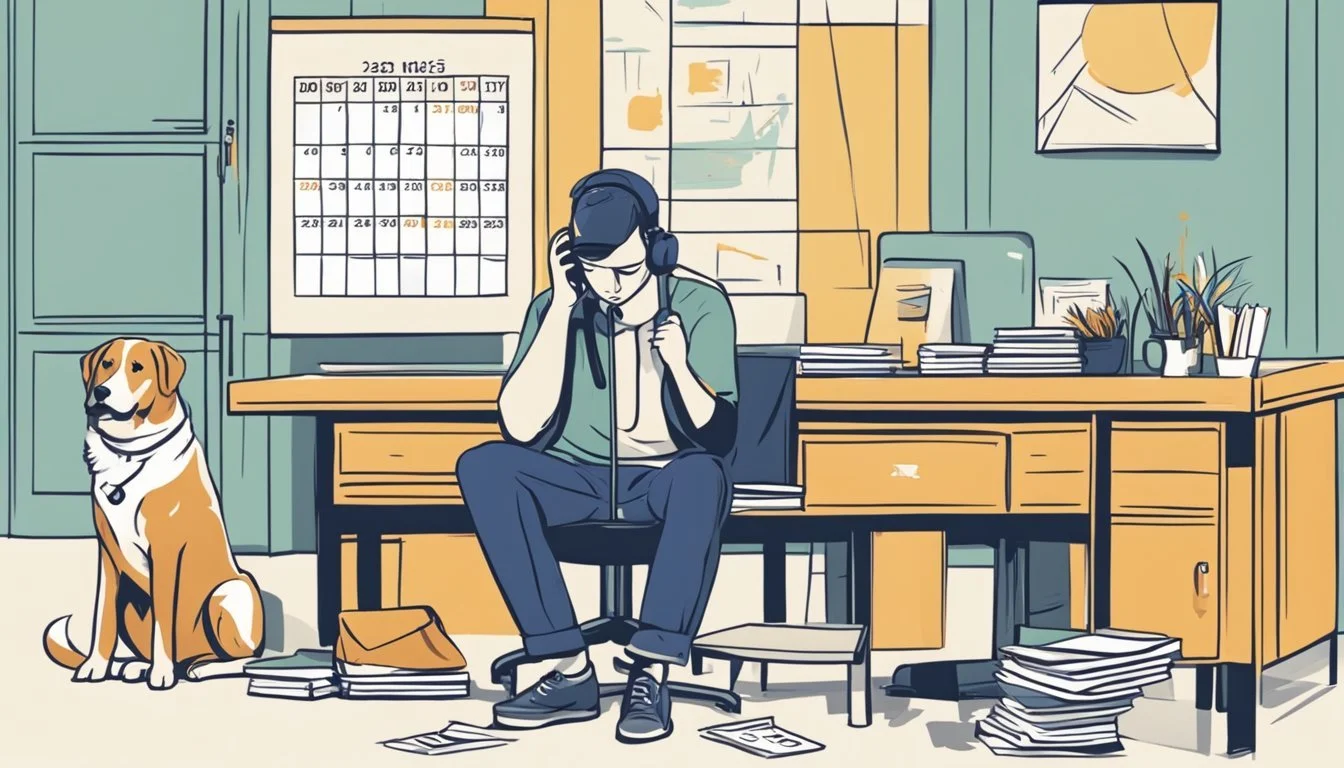9 Signs Your Friend Is Only Around When They Need Something
Identifying Selfish Behavior
Friendships play a vital role in our lives, offering support, companionship, and mutual respect. However, identifying when someone is only around during their own times of need can be challenging. This article aims to shed light on the signs that indicate a friend may be taking advantage of the relationship.
Recognizing these signs is crucial for maintaining healthy and balanced friendships. By understanding these indicators, individuals can make informed decisions about their social connections and ensure their emotional well-being.
1) Always Asks for Favors
A key sign that a friend is only around when they need something is their constant requests for favors. They often reach out primarily when they require help rather than engaging in mutual activities.
These friends may frequently ask for help such as borrowing money or requesting assistance on projects. This behavior can leave you feeling undervalued and taken for granted.
Additionally, they might not reciprocate the support or favors you extend to them. This one-sided dynamic emphasizes the imbalance in the friendship, where your needs and boundaries are often overlooked.
Friends like this might not be there for you during your own times of need, highlighting their self-centered approach to the relationship. The pattern of requesting favors without offering genuine support is a tell-tale sign of their intentions.
If you notice that conversations with this friend often revolve around their requests, it's time to reassess the nature of the friendship.
2) Rarely Initiates Contact
A key sign that a friend may be around only when they need something is their tendency to rarely initiate contact. This behavior often manifests as one-sided communication where the individual seldom, if ever, makes the effort to reach out. Instead, they rely on the other party to keep the relationship alive.
When a friend rarely initiates contact, it can indicate a lack of genuine interest in maintaining the relationship. They might only get in touch when they need a favor or support, showing a transactional approach to the friendship. This discrepancy in initiating contact can be a red flag that the relationship is lopsided.
Friends who rarely reach out can make you feel undervalued and taken for granted. If you notice that you are always the one to start conversations, schedule meet-ups, or check in, it might be time to reconsider the dynamics of the friendship.
Individuals who rarely initiate contact might also exhibit other concerning behaviors. For example, they could be inconsistent in their demeanor, being warm and friendly when they need help and distant otherwise. This behavior creates an imbalance and can make the friendship feel unsatisfactory.
In friendships, effort should be mutual. One should not consistently have to chase the other for interaction. If a friend displays this pattern, it's worth evaluating the relationship critically. For more signs of when a friendship might be one-sided, you can explore articles such as People who are only nice to you when they need something.
3) Never Supports You
A key sign that a friend is only around when they need something is their lack of support. True friends celebrate your achievements, offer a helping hand when needed, and listen attentively during tough times. When someone never supports you, it's a clear indication that the relationship might be one-sided.
Consider those moments when you needed emotional backing or even just someone to talk to. If they are consistently unavailable or disinterested during your times of need, this is a red flag. Support in a friendship should be mutual.
Observe their reactions when you share good news. Do they seem genuinely happy for you, or do they quickly shift the focus back to themselves? A friend who never supports you might display jealousy or indifference instead of excitement for your achievements.
Additionally, think about the advice they give you. Supportive friends offer constructive and well-meaning advice. If your friend dismisses your concerns or steers you towards poor decisions, it can undermine your well-being. Friends who never support you emotionally might also detract from your personal growth and happiness.
For more details about such friendship issues, you can refer to signs someone is actually not your true friend and understand the dynamics better.
4) Cancels Plans Frequently
A friend who consistently cancels plans might be unreliable. This behavior can be frustrating and lead to feelings of neglect.
They may offer various reasons for canceling, from work commitments to personal issues. While understandable on occasion, a pattern can indicate they view your friendship as less of a priority.
Communicating your feelings can be helpful. Encourage honesty and express how repeated cancellations affect you.
Some friends may cancel last minute without providing adequate notice. This is not only disruptive but also suggests a lack of consideration for your time.
Offering to reschedule might be a good test. If they are genuinely interested, they will make an effort to set another date.
If this pattern continues, assess the overall balance in your relationship. Healthy friendships involve mutual respect and effort.
Regularly canceled plans could signify that your friend is only interested in being around when convenient for them. This is a sign worth noting.
5) Only Talks About Their Problems
When a friend only talks about their problems, it can be draining. They may start conversations by immediately diving into their latest issue without asking how you are.
This behavior often stems from a self-centered perspective. They prioritize their own needs and overlook yours, making the friendship feel one-sided.
Such friends tend to use you as a sounding board. They constantly unload their problems, expecting you to listen and offer advice.
It's not uncommon for them to dominate conversations. This leaves little room for you to share your own experiences or feelings.
A balanced friendship involves mutual support and understanding. If your friend shows no interest in your life, the friendship may not be healthy.
One-sided conversations hurt the relationship. If you've addressed this with your friend and nothing changes, it might be time to reassess the friendship.
Reevaluating friendships where you're not valued equally is important. Ensuring mutual reciprocity helps maintain healthy relationships.
If you're always on the receiving end of complaints, it's understandable to feel frustrated. Friendships should be about give and take.
Consider discussing your feelings with your friend. Clear communication can sometimes help shift the nature of the exchanges.
If the situation remains unchanged, creating distance or focusing on more balanced relationships might be necessary.
6) Does Not Celebrate Your Successes
A true friend shares in your victories, big or small. When a friend is only around when they need something, their enthusiasm for your achievements suddenly wanes. They might offer a half-hearted congratulations or ignore your accomplishments altogether.
This behavior often stems from jealousy or insecurity. They may feel threatened by your success because it highlights their own shortcomings or failures. Instead of celebrating with you, they might change the subject or even downplay your achievements.
A key sign is if they switch topics quickly or find faults in your success. For instance, they might say, "That's great you got a promotion, but it’s not a big deal in this economy." This diminishes your joy and underscores their unwillingness to support you genuinely.
Friends who aren't invested in your success often avoid discussing it. When a promotion, new job, or personal milestone appears in conversation, they seem uninterested or uncomfortable. Real friends are excited and eager to celebrate your progress.
If you notice these signs, it's a red flag that your friend's support is conditional. Genuine friendships thrive on mutual joy and shared celebrations, not envy or indifference. Consider reevaluating relationships where your success isn't appreciated or acknowledged.
For more insights, see how friends can be jealous of your success and what behaviors to watch out for.
7) Often Ignores Your Messages
One clear sign that a friend may be around only when they need something is if they frequently ignore your messages. Communication should be a two-way street. If your messages are often left unanswered, it might indicate a lack of genuine interest.
Ignoring messages consistently can signal one-sided priorities. When a friend only responds when they need help, it suggests they don't value the relationship equally. This behavior might be more evident if they promptly respond when they need something from you.
A pattern of unanswered messages may also reflect a lack of respect. If your friend is consistently too busy to reply, it could mean they don't regard your time and friendship as important. True friends make time for each other, despite their busy schedules.
In friendships, consistent communication is key. If ignored messages become a regular occurrence, it’s a sign to reassess the relationship. You deserve friends who are as attentive and responsive as you are. To learn more, check out why friends may ignore you.
8) Compliments Downplayed
When someone downplays compliments, it can be a sign they only value the friendship when it benefits them.
They might brush off any praise you offer, making it seem insignificant. This behavior can indicate a lack of genuine appreciation for your presence in their life.
They may redirect the compliment back to you or change the subject quickly. This can make you feel like your efforts to support them are unnoticed or unimportant.
If their pattern involves consistently minimizing your positive remarks, it might reveal a self-centered approach to the relationship. They might see the friendship as a means to an end rather than valuing you for who you are.
For more insights into friendship red flags, refer to 11 signs someone is actually not your true friend.
9) No Interest in Your Life
A clear sign that a friend is only around when they need something is their lack of interest in your life. They rarely ask about your day or how you're feeling. Conversations tend to be one-sided, focusing primarily on their issues and needs.
When you try to share details about your experiences, they seem distracted or disinterested. This behavior can leave you feeling undervalued and ignored.
If this pattern persists, it suggests their connection with you is not about mutual support. They may consistently interrupt or steer conversations back to themselves.
Authentic friendships involve mutual curiosity and care for each other's lives. When this element is missing, it's a red flag. Genuine friends show a consistent interest in the events and feelings that shape your world.
Lacking this reciprocal interest is a strong indicator of their motives. This behavior can make you question the foundation of your relationship and whether it's worth maintaining. For more on this topic, see signs it's time to end a friendship.
Emotional Consequences of One-Sided Friendships
One-sided friendships can take a significant toll on a person's emotional well-being. This impact manifests primarily through lowered self-esteem and heightened feelings of isolation.
Impact on Self-Esteem
When a person invests in a friendship only to find their efforts unreciprocated, self-esteem can suffer. They may start to question their worth and feel undervalued. Consistently feeling like the relationship isn't mutual can lead to a loss of confidence. This erosion of self-worth can spread to other areas of life, affecting work, family, and other social interactions.
Unchecked, this dynamic may foster a sense of inadequacy, causing the individual to doubt their attractiveness as a friend. Over time, this can create a self-fulfilling prophecy, where diminished self-worth leads to further challenges in forming and maintaining healthy relationships.
Feelings of Isolation
One-sided friendships can also evoke profound feelings of isolation. When someone is continuously the one to reach out, bear the emotional brunt, and support their friend, they may feel lonely and unimportant. This isolation arises from the lack of genuine, mutual interaction that characterizes healthy relationships.
Loneliness isn't simply a sense of being alone; it's the emotional and psychological effect of feeling disconnected. Over time, these feelings can exacerbate mental health issues such as anxiety and depression. It is crucial for individuals in one-sided friendships to recognize these signs and seek balance or support to mitigate these effects.
Strategies for Addressing Unbalanced Friendships
Addressing unbalanced friendships starts with setting clear boundaries and maintaining open communication. Each step plays a crucial role in establishing a healthier and more balanced dynamic.
Setting Boundaries
Establishing boundaries is essential to ensure that a friendship remains healthy and balanced. Defining one's limits helps prevent emotional exhaustion and resentment. It's important to be clear about what behaviors are unacceptable and to communicate these boundaries firmly but kindly.
For instance, if a friend frequently cancels plans last-minute, it’s crucial to inform them that such behavior is disruptive and hurts the relationship. Additionally, setting limits on how much personal information is shared can prevent a friend from using you as an emotional dumping ground. This helps protect one's mental and emotional well-being.
Regularly reassessing boundaries ensures they remain relevant and effective. Boundaries should be respected by both parties to maintain a respectful and supportive relationship.
Communicating Openly
Open communication involves expressing feelings and expectations honestly without imposing judgment. This means addressing imbalances directly, articulating how specific actions affect the relationship, and suggesting changes to improve the dynamic.
For example, if one feels that they are always the one reaching out, it’s helpful to explain this feeling to the friend and suggest alternating who initiates contact. Talking about how one feels unsupported can encourage the friend to be more considerate and proactive.
Active listening is equally important. Allow the friend to share their perspective and work together to find mutual solutions. Effective communication fosters understanding and can significantly improve the balance in a friendship.
Maintaining Healthy Relationships
Healthy relationships require mutual effort and the fostering of genuine connections. It’s about creating a balanced dynamic where both parties feel valued and respected.
Recognize Mutual Effort
Mutual effort is crucial for any healthy relationship. Both parties should engage equally. It involves communicating openly, sharing responsibilities, and supporting each other. One sign of mutual effort is when both friends take the initiative to reach out and plan activities.
A friend who only contacts you when they need something might not exhibit these behaviors. Instead, a healthy friend will check in regularly, showing investment in the relationship without any ulterior motives. This balance ensures that neither party feels taken for granted or burdened.
Fostering Genuine Connections
Genuine connections go beyond surface-level interactions. They involve getting to know each other deeply, building trust, and being present during significant moments. It's essential to create safe spaces where both friends can express themselves authentically.
Engaging in meaningful conversations, actively listening, and offering emotional support are all parts of fostering these connections. Friends in a healthy relationship prioritize spending quality time together, sharing experiences, and growing together. This approach is crucial in differentiating between friends who are genuinely interested in the relationship and those who are only around for convenience.












